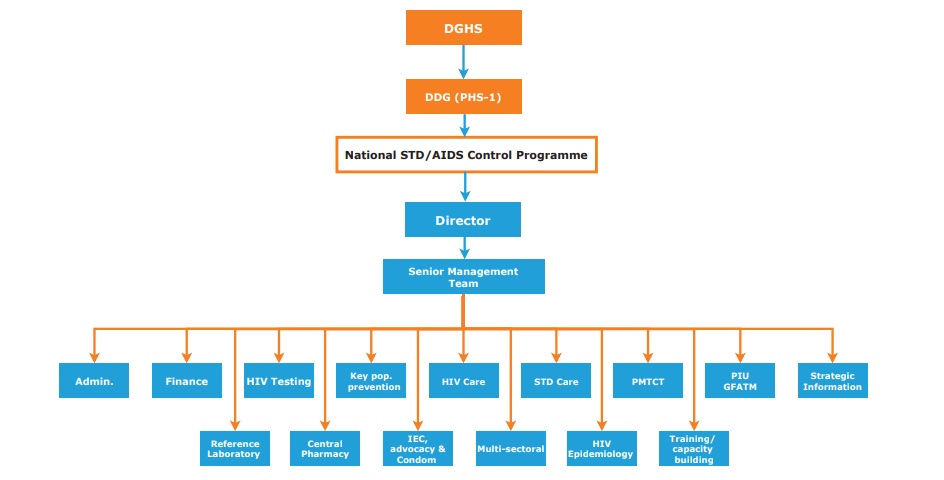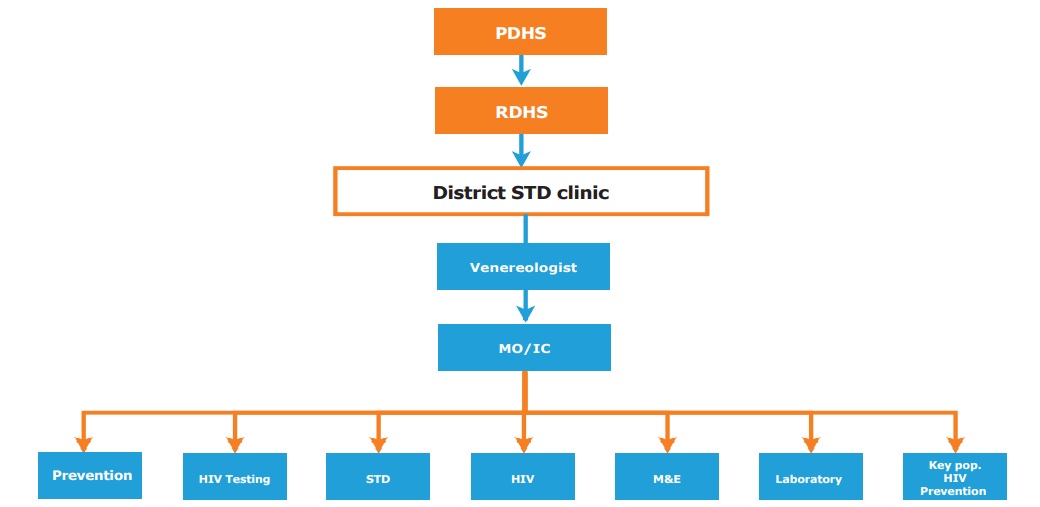Questions related to sexually transmitted infections
1. What are the common symptoms of sexually transmitted infections (STIs) in men?
The symptoms depend on the STI you have. Mostly there will be few, or no symptoms and you might not know you have an STI. If there is risky sexual exposure, go to an STD clinic and get yourself tested. The symptoms of STIs in males are,
- Discharge from the penis
- Pain or burning sensation while urination
- Painful blisters and ulcers around the genitals or anus
- Warts are small, fleshy, mostly painless growths or bumps around the genitals or anus.
- Lumps- Inguinal lymph nodes
- Scrotal pain
2. What are the common symptoms of STIs in women?
The symptoms depend on the STI you have. Mostly, there will be few, or no symptoms, and they might not know that they have an STI. The symptoms of STIs in females are,
- abnormal Vaginal discharge: it could be yellowish, greenish, frothy, foul-smelling, or blood-stained.
- Pain or burning sensation while urination
- Painful blisters or ulcers around the genitals or anus
- A tingling or itching around the genitals
- Warts are small, fleshy, mostly painless growths or bumps around the genitals or anus
- Pelvic pain
- Dyspareunia causes pain while having sex
- Lumps- Inguinal lymph nodes
3. Is there a treatment for STIs? Can STIs be cured completely?
Yes, treatment is available for STIs, Some STIs can be completely cured. Some can be controlled to relieve symptoms. STIs caused by bacteria can be treated with antibiotics, but STIs caused by viruses may not be cured, although they can be managed.
4. Is there a connection between HIV and other STIs?
HIV-related questions
5. What is HIV?
6. What is HIV and what is AIDS?
7. What are the symptoms of early HIV infection?
8. What are the symptoms of late HIV infection?
9. How could I know that I’m infected with HIV?
10. Where can I get tested for HIV?
11. What is AIDS?
12. What is the immune system?
13. How does HIV cause AIDS?
14. What are the symptoms of AIDS?
Someone can be diagnosed with AIDS even if they have not developed an opportunistic infection. AIDS can be diagnosed when the number of immune system cells (CD4 cells) in the blood of an HIV-positive person drops below a certain level.
15. Is there a cure for AIDS?
There are drugs called antiretrovirals that can control the multiplication of the virus. As a result, the viral load is lowered, the immunity is restored, and the survival rate is increased. These drugs cannot completely kill HIV.
16. How long does it take for HIV to cause AIDS?
Without any medication, about half the people with HIV would develop AIDS within 10 years of becoming infected. This time varies greatly from person to person and depends on many factors. There are host-specific and virus-related factors that influence the progression of HIV infection.
Anti-retroviral treatment has dramatically changed the progression time between HIV infection and the development of AIDS.
17. How well does HIV survive outside the body?
18. Can I get HIV from kissing?
HIV is not transmitted by kissing, so kissing on the cheek is very safe. Your unbroken skin is a good barrier even if the other person has the virus. No one has become infected by such ordinary social contact as dry kisses, hugs, and handshakes.
Open-mouth kissing is considered a very low-risk activity for the transmission of HIV. However, prolonged open-mouth kissing could damage the mouth or lips and allow HIV to pass from an infected person to a partner and then enter the body through cuts or sores in the mouth.
19. Can I get HIV from oral sex?
23. Can a woman who has HIV pass on the disease to her unborn child or her newborn child through breastfeeding?
24. Can I get HIV from visiting barber saloons, getting a tattoo, or through body piercing?
26. Can a person be HIV positive and be healthy looking?
27. What is the period we should wait to get an HIV test done following risky sexual exposure? ( Window period)
The only way to find out whether you are infected with HIV or not is to get an HIV test done. There is no test to identify HIV just after infection. There is a time lag between HIV entering the body and when a test can detect the virus or the antibodies developed in the body against the virus. It is called the "window period."
So, if you test too soon, there is a possibility that you may get a falsely negative result. The window period varies according to the test that you are being tested with. The combined antigen-antibody test, which is used in our clinics for screening, can pick up the viral antigen (P24) in 2 to 6 weeks after infection.
But the window period from finger prick rapid detection or oraquick (Saliva) test may take a little longer. Almost every HIV-positive individual has detectable antibodies at 3 months.
28. Is there treatment available for HIV?
29. Can HIV be cured with available treatment?
30.How does HIV pass from one infected person to another?
There are only three ways in which HIV can be transmitted from one person to another.
- Having unprotected sex with an HIV-infected person
- From an infected mother to her baby during pregnancy, at the time of delivery, or via breast milk.
- By injection or transfusion of contaminated blood or blood products, donations of semen (artificial insemination), skin grafts or organ transplants taken from someone who is infected. Sharing unsterilized injection equipment that has previously been used by someone who is infected is a very efficient mode of HIV transmission.
Important to note,
- HIV is not transmitted by sharing meals, sharing clothes, holding hands, lip kissing, or using the same toilet.
31.Is it possible to avoid HIV infection after a risky sexual encounter (Post-exposure prophylaxis following sexual exposure-PEPSE)?
32. Can HIV and STIs be transmitted by oral sex?
HIV is present in blood and semen, which means that this is a possible transmission route.
There may be an increased risk if there is ejaculation, bleeding gums or sores anywhere in the mouth or around the lips (or genitals), or inflammation caused by common throat infections or sexually transmitted infections. Other STIs like syphilis, herpes, and gonorrhoea can be transmitted through oral sex.
33. Will I get HIV by kissing?
HIV is not transmitted by kissing, so kissing on the cheek is very safe. Your unbroken skin is a good barrier even if the other person has the virus. No one has become infected by such ordinary social contact as dry kisses, hugs, and handshakes.
Open-mouth kissing is considered a very low-risk activity for the transmission of HIV. However, prolonged open-mouth kissing could damage the mouth or lips and allow HIV to pass from an infected person to a partner and then enter the body through cuts or sores in the mouth.
36. Can I get married if I have an STI or HIV?
True. There is no barrier to getting married if you have an STI or HIV. But you must take all the precautions to prevent your marital partner from acquiring the illness from you. If it is HIV, you should come to regular clinic visits, keep your viral load undetectable, and always use condoms.
We encourage the divulgence of your status to your partner, which helps in a healthy and responsible relationship.
37. If I’m already infected with HIV, can I prevent HIV transmission to my sexual partner?
Using condoms correctly and consistently can prevent HIV transmission from an infected person to a partner. If you are already infected, taking HIV medicines as prescribed by your doctor is of utmost importance since the transmission risk is zero if your viral load is undetectable. (U=U Undetectable=Untransmittable).
If there is a difficulty in using condoms consistently, there is another method of HIV prevention called Pre- Exposure Prophylaxis (PrEP) where people who don’t have HIV take HIV medication to reduce their risk of getting HIV. PrEP is also available in STD clinics, and you can discuss with the doctor your suitability.
38. If I’m already infected with HIV, can I have healthy babies?
39. What should I do if I sustain a needle prick injury?
40. Is masturbation bad?
Masturbation is a healthy form of sexual gratification. It does not have a risk of acquiring a sexually transmitted infection or any chance of pregnancy.
It can help you reduce stress, improve your mood, and relax.
But some people don't masturbate. Those people are also considered normal.
But it will be problematic if you get addicted to masturbation and addicted to pornography, which would affect your day-to-day activities and lead to low sexual sensations during sexual intercourse.
41. Is there significance in the size of the penis?
The size of the penis varies among different individuals. A micro penis is an abnormality that is diagnosed medically when the size of the erect penis is less than 3 inches, but it is only present in less than 1% of the population.
The size of the penis does not affect the sexual satisfaction of the male or his partner, and there are no approved medications to increase the size of the penis.
42. Can I book an HIV test and come for testing?
43. Can I get treatment for Sexual dysfunction from STD clinics?
44. What is PEP?
45. What is PrEP?
It is a method of HIV prevention to be taken before possible exposure to HIV infection. It can be taken daily or event-driven basis. This is available from the STD clinic network.
46. How to get free condoms and lubricants?
47. What are the clinic hours?
48. Do you need a doctor’s referral to come to an STD clinic?
49. I had unprotected sex today- what are the services and tests available for me?
A range of services including counselling, testing, and Post Exposure prophylaxis (PEP) is available for you. Please visit the nearest STD clinic or call the PEP hotline for further information.




